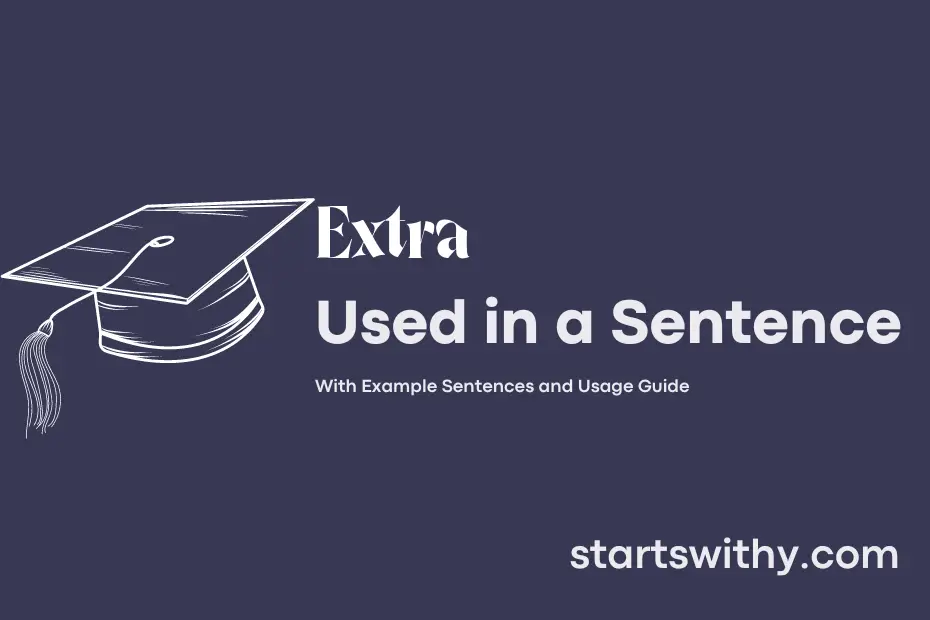Do you ever find yourself in need of a little something “extra” to complete your writing or enhance your message? An example sentence with “extra” can be a powerful tool to illustrate a point or provide further clarification.
An example sentence with “extra” serves as a concrete demonstration of how to use a word or phrase in context, giving readers a tangible reference point for understanding its meaning and usage. By incorporating such sentences into your writing, you can add depth and clarity to your communication, ensuring that your ideas are effectively conveyed.
7 Examples Of Extra Used In a Sentence For Kids
- We can all share extra crayons during art time.
- Don’t forget to bring extra snacks for our picnic.
- You can wear extra colorful clothes to the dance party.
- Let’s put extra effort into our group project.
- I have an extra book you can borrow for storytime.
- We can make extra bubbles by blowing harder.
- Remember to say extra please and thank you.
14 Sentences with Extra Examples
- Extra books were added to the library for students to borrow.
- Make sure to take extra notes during the lecture for better understanding.
- I bought some extra stationery supplies for the upcoming exams.
- The professor provided us with some extra study material for the assignment.
- I need to put in some extra effort to improve my grades this semester.
- The cafeteria offered extra discounts for students during the college fest.
- I stayed up all night to do some extra research for my project.
- The college organized an extra workshop on interview preparation for us.
- I signed up for an extra elective course to broaden my knowledge.
- The college library has a collection of extra resources for research purposes.
- I decided to do some extra reading to enhance my understanding of the subject.
- The professor gave me some extra tips on how to tackle the upcoming exam.
- The college gym offers extra fitness classes for students who want to stay active.
- I received some extra feedback from the professor to improve my essay.
How To Use Extra in Sentences?
To use the word “Extra” in a sentence, it is important to understand its meaning and how it can enhance the sentence. “Extra” is commonly used to refer to something additional, more than what is necessary, or an enhancement to the existing.
Here are a few examples to help you understand how to use “Extra” in a sentence:
- “Can I get some extra ketchup with my fries, please?”
- “She always puts in extra effort to make sure her projects are successful.”
- “I love the extra features that come with this upgraded phone.”
- “We received an extra dessert with our meal as a special treat.”
- “He chose the extra long route to enjoy the scenic drive.”
When using extra in a sentence, make sure it is appropriately placed to convey the intended meaning. It can be used before adjectives to emphasize an increased amount or degree, as in “She was extra careful while handling delicate items.” It can also be used as a standalone noun or adverb to describe something additional, as in “I will pay extra for express shipping.”
By incorporating “extra” in your sentences, you can add depth and emphasis to your communication, whether in written or spoken form.
Conclusion
In writing, it is essential to avoid sentences with extra words that do not contribute meaningfully to the text. These sentences can make the writing unclear, wordy, and difficult for the reader to follow. By eliminating unnecessary words and phrases, writers can create concise and effective communication that conveys their message clearly.
Focusing on crafting sentences with precision and conciseness not only improves readability but also enhances the impact of the writing. Writers should strive to convey their thoughts efficiently, cutting out any extraneous information or filler words. By doing so, they can make their writing more powerful, engaging, and easily understood by their audience.




